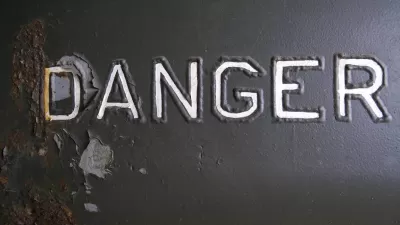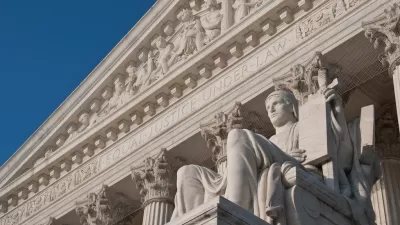An Ohio Senator hopes to use the transportation reauthorization bill to motivate states that issue license plates bearing the Confederate flag to remove them. A week ago the Supreme Court ruled states can do so without violating the first amendment.
The debate centering around the Confederate flag flying on the capitol grounds in Columbia, South Caroilna may be coming to the U.S. Senate—in the form of a transportation reauthorization amendment.
"The federal government should use 'all its powers' to make states stop displaying the Confederate flag on public property, Sen. Sherrod Brown said Wednesday," writes Deirdre Shesgreen of USA TODAY. "The Ohio Democrat said he would start that push by introducing legislation to strip a portion of federal highway dollars from any state that allows the Confederate flag to be displayed on its license plates."
Under Brown's legislation, which he is still crafting, if a state allowed specialty plates featuring the Confederate flag, it would lose 5 percent of its federal highway funds. He said he might expand the proposal to apply to other places where the Confederate flag is displayed.
Any legal impediment to Brown's plan as it applies to license plates would appear to have been removed by a June 18 ruling by the Supreme Court on this topic. "Texas did not violate the First Amendment when it refused to allow specialty license plates bearing the Confederate battle flag," wrote Adam Liptak of The New York Times on the outcome of Walker v. Texas Division, Sons of Confederate Veterans.
"Brown said he plans to offer the bill as an amendment to the highway bill, a must-pass piece of legislation," writes Shesgreen. The six-year bill, known as the Drive Act, was unanimously passed by the Senate Environment and Public Works Committee on June 24.
"(A)ll eyes turn to the other three Senate committees that will contribute to this bill: the Banking Committee, which writes the transit title, the Commerce Committee, which writes the rail and safety title, and the Finance Committee, which has the hardest job of all — figuring out how to pay for it all," writes Tanya Snyder of Streetsblog USA.
No word on whether Brown would attach his amendment to a likely patch bill needed to keep the roads funds when the current extension expires on July 31.
FULL STORY: Cincinnati Enquirer: Brown: Drop Confederate flag from plates - or pay

Maui's Vacation Rental Debate Turns Ugly
Verbal attacks, misinformation campaigns and fistfights plague a high-stakes debate to convert thousands of vacation rentals into long-term housing.

Planetizen Federal Action Tracker
A weekly monitor of how Trump’s orders and actions are impacting planners and planning in America.

San Francisco Suspends Traffic Calming Amidst Record Deaths
Citing “a challenging fiscal landscape,” the city will cease the program on the heels of 42 traffic deaths, including 24 pedestrians.

Defunct Pittsburgh Power Plant to Become Residential Tower
A decommissioned steam heat plant will be redeveloped into almost 100 affordable housing units.

Trump Prompts Restructuring of Transportation Research Board in “Unprecedented Overreach”
The TRB has eliminated more than half of its committees including those focused on climate, equity, and cities.

Amtrak Rolls Out New Orleans to Alabama “Mardi Gras” Train
The new service will operate morning and evening departures between Mobile and New Orleans.
Urban Design for Planners 1: Software Tools
This six-course series explores essential urban design concepts using open source software and equips planners with the tools they need to participate fully in the urban design process.
Planning for Universal Design
Learn the tools for implementing Universal Design in planning regulations.
Heyer Gruel & Associates PA
JM Goldson LLC
Custer County Colorado
City of Camden Redevelopment Agency
City of Astoria
Transportation Research & Education Center (TREC) at Portland State University
Jefferson Parish Government
Camden Redevelopment Agency
City of Claremont





























